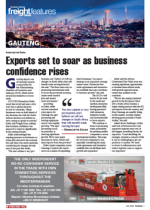The Tshwane Automotive Special Economic Zone (TASEZ) is a game-changer in South Africa’s SEZ landscape, spotlighting the country's potential as a top automotive manufacturing hub.According to Dr Bheka Zulu, CEO of TASEZ, expanding the automotive industry holds vast economic potential for the country. “With a variety of incentives for investors eager to join an innovative economic development, TASEZ is set to drive significant growth,” he told Freight News.Known as Africa's first automotive city, TASEZ exemplifies the rapid and agile development of an SEZ. From being gazetted in January 2020 to rolling out the first cars in November 2022, it has demonstrated remarkable achievement despite the global pandemic.The SEZ was set up through a unique partnership between the Ford Motor Company of Southern Africa and all three tiers of government – the Department of Trade, Industry and Competition, the Gauteng Department of Economic Development, and the City of Tshwane.“It was a pilot project of a new integrated strategic partnership to be used by SEZs in South Africa,” said Zulu. “National government focused on the high-level structure, the provincial government provided funding for the infrastructure within the zone, and local government provided infrastructure such as roads and electricity in the zone.”The project has been hugely successful, unlocking R16 billion through Ford to upgrade its facilities in Silverton, Tshwane. The government pooled its resources, providing an additional R3.9bn investment. This facilitated the setup of Phase 1 of the TASEZ hub next to the Ford factory in Silverton, creating a hi-tech network of interconnected producers.Anchored by Ford Frame and surrounded by 10 other Ford component manufacturers, these businesses collectively contributed a further R5.6bn in investment. “A key driver of TASEZ’s business approach is the South African Automotive Masterplan, with its focus on transforming the sector, promoting localisation and creating jobs,” explained Zulu.He said investors benefitted from the world-class infrastructure, including state-of-the-art roads, reliable energy supply and cutting-edge telecommunications. This ensures that businesses within the precinct can optimise their operations, minimise down time and stay competitive in a fast-paced industry.“The first phase of TASEZ has created 3 244 permanent jobs in the automotive manufacturing sector and an additional 5 071 jobs in construction,” said Zulu. “Procurement spend with small, medium and micro enterprises has totalled R1.7bn so far, predominantly with local enterprises. This aligns with our drive to localise skills, resources and materials. Phase one developed 91.5 hectares of land, meeting international sustainability standards for power and water resources.”

